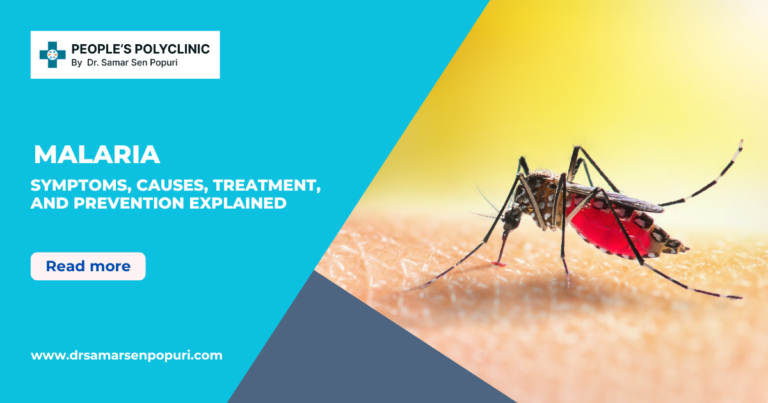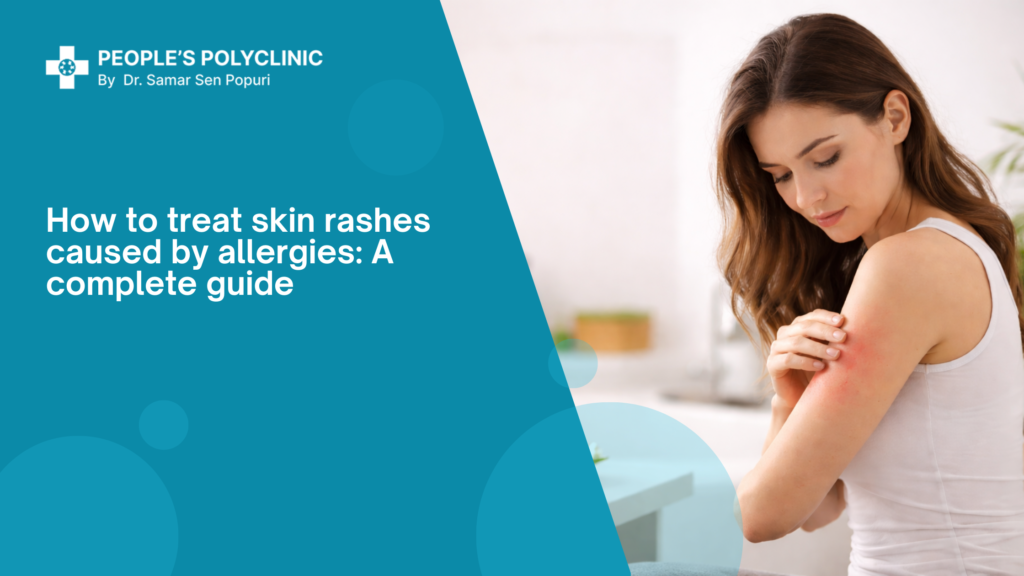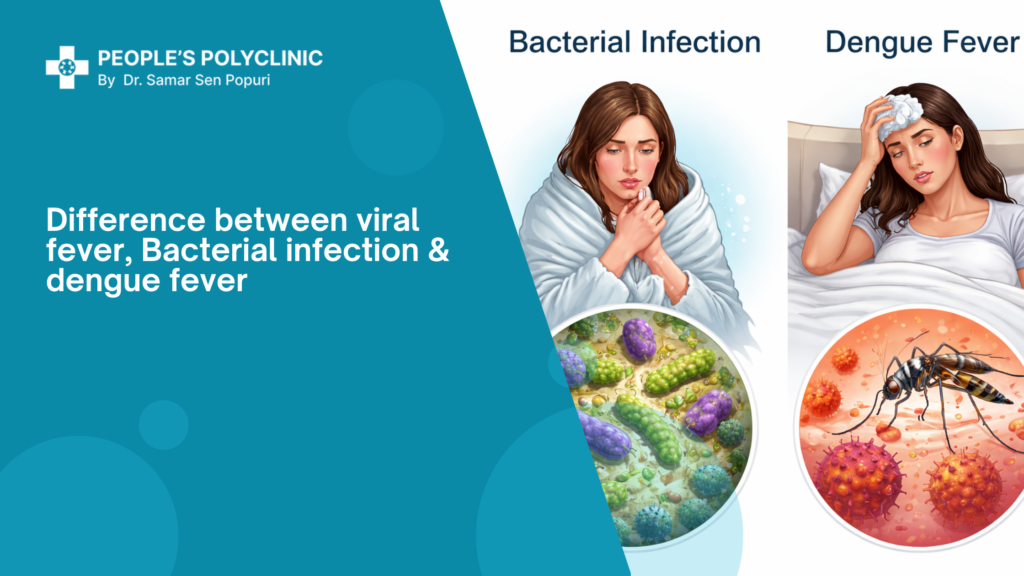Malaria is a life-threatening disease caused by Plasmodium parasites transmitted through the bite of infected female Anopheles mosquitoes. Despite being preventable and treatable, malaria continues to pose a significant global health threat, particularly in tropical and subtropical regions.
For residents in endemic areas, malaria can affect daily life and productivity, while for travelers, it remains a dangerous risk if proper malaria prevention measures aren’t taken. Early recognition of malaria symptoms, prompt malaria diagnosis, and timely malaria treatment in Hyderabad are crucial to prevent severe complications.
What is Malaria?
Understanding the causes of malaria is essential for both prevention and treatment. Malaria occurs when Plasmodium parasites enter the bloodstream, multiply in the liver, and eventually infect red blood cells.
The most common parasites affecting humans include Plasmodium falciparum, Plasmodium vivax, Plasmodium ovale, and Plasmodium malariae. These parasites disrupt oxygen transport in the blood and trigger the body’s immune response, leading to fever, chills, and fatigue.
Transmission & Causes of Malaria
The primary cause of malaria is the bite of an infected mosquito, but human-to-human transmission can also occur through blood transfusions, organ transplants, or shared needles.
How Malaria Spreads?
- Female Anopheles mosquitoes bite infected individuals and then transmit parasites to healthy humans.
- The parasites multiply first in the liver and then attack red blood cells, causing the characteristic fever and chills.
Types of Malaria
Different types of malaria are associated with different parasite species:
- P. falciparum: Most severe, can lead to cerebral malaria.
- P. vivax and P. ovale: Can cause relapses due to dormant liver stages.
- P. malariae: Less common but can persist chronically.
Symptoms of Malaria
Recognizing malaria symptoms early can save lives.
Early Symptoms
- Fever and chills
- Sweating
- Headache
- Fatigue
- Nausea and vomiting
Severe Malaria
In some cases, malaria progresses to severe malaria, causing:
- Confusion or disorientation
- Seizures
- Severe anemia
- Kidney or liver failure
- Respiratory distress
The early symptoms of malaria include frequent fevers, Chills and the body aches within 10–15 days of a mosquito bite are early warning signs.
Diagnosis of Malaria
Malaria diagnosis is critical, especially for those with travel history to endemic areas.
Diagnostic Methods
- Blood smear microscopy – the gold standard for detecting Plasmodium parasites.
- Rapid diagnostic tests (RDTs) – detect parasite antigens for quick results.
- PCR tests – used in specialized centers for accurate species identification.
How is malaria diagnosed in humans?
Blood samples are examined under a microscope or tested with antigen-based kits to confirm infection.
Treatment of Malaria
Early malaria treatment prevents complications and reduces mortality.
Standard Medicines
- Artemisinin-based combination therapies (ACTs): First-line treatment for P. falciparum.
- Chloroquine: Used for P. vivax in non-resistant areas.
- Primaquine: Targets dormant liver stages to prevent relapse.
Antimalarial drugs should be taken under medical supervision. Delays in treatment increase the risk of severe malaria.
Can malaria be cured permanently? With proper treatment, most malaria cases are curable, but relapsing types (P. vivax, P. ovale) require additional therapy to prevent recurrence.
For residents of Hyderabad, malaria treatment in Hyderabad is available at specialized clinics and hospitals. A malaria doctor near me can guide diagnosis and the best treatment options. People’s Poly Clinic is one of the leading malaria hospitals in Hyderabad, providing fast and reliable care.
Prevention of Malaria
Effective malaria prevention requires a combination of personal protection and medical measures.
Preventing Mosquito Bites
- Use insecticide-treated nets (ITNs).
- Apply mosquito repellents on exposed skin.
- Wear protective clothing, especially at dawn and dusk.
Preventive Medications
Travelers to endemic areas may take chemoprophylaxis, such as atovaquone-proguanil or doxycycline.
Role of Vaccines
The malaria vaccine (RTS,S/AS01) is available in certain regions and offers partial protection, particularly for children.
How to prevent malaria while traveling? Some of the procedure include, follow local advisories, sleeping under nets, using repellents and consulting a healthcare provider for preventive medications.
Who’s Most at Risk?
Understanding malaria risk factors helps prioritize prevention:
- Children under 5 years
- Pregnant women
- People with weak immunity
- Travelers to malaria-endemic regions
Who is most at risk of malaria? Those with limited access to healthcare, previous malaria infections, or travel exposure.
Complications of Malaria
Severe and untreated malaria can lead to:
- Cerebral malaria – seizures, coma
- Anemia – due to destruction of red blood cells
- Organ damage – kidneys, liver, lungs
- Relapses – mainly from P. vivax and P. ovale
Early malaria diagnosis and treatment are critical to prevent these outcomes.
Conclusion
Malaria is a serious yet preventable and treatable disease. Recognizing malaria symptoms, understanding the causes of malaria, seeking prompt malaria diagnosis, and following recommended malaria prevention steps are key to safeguarding health.
Residents of Hyderabad and travelers should be vigilant, especially during monsoon seasons. Early medical consultation, adherence to treatment protocols, and preventive strategies like mosquito nets, repellents, and vaccines can save lives.
If you notice symptoms or have travel exposure, consult the best malaria treatment in Hyderabad at a trusted clinic like People’s Poly Clinic, one of the top malaria hospitals in Hyderabad.
FAQ Section
What are 5 symptoms of malaria?
Fever, chills, sweats, headache, fatigue.
What is the first stage of malaria?
Parasites multiply in the liver, followed by blood infection causing fever.
How do you know if you have malaria?
Through blood tests such as smear microscopy or rapid diagnostic tests.
Can malaria go away without treatment?
Some mild cases may resolve, but untreated malaria can become severe and life-threatening.
What causes malaria?
Plasmodium parasites transmitted by female Anopheles mosquitoes.
How is malaria diagnosed?
Blood smear, rapid tests, or PCR tests to detect the parasite.
How is malaria treated?
With antimalarial drugs such as ACTs, chloroquine, or primaquine under medical supervision.
Can malaria be cured permanently?
Yes, most cases can be cured, but relapsing types require extra therapy.
What is the difference between malaria and dengue fever?
Malaria is caused by Plasmodium parasites; dengue is viral. Malaria presents with cyclical fevers; dengue often has continuous high fever and rash.
Which part of the body is affected by malaria?
The liver initially, then red blood cells throughout the body.
What are the early warning symptoms of malaria?
Fever, chills, headache, fatigue, and nausea.
How long does malaria stay in your system?
Depends on parasite species; P. vivax and P. ovale can relapse months later.
How can malaria be prevented?
Use nets, repellents, protective clothing, preventive drugs, and vaccines where available.
Who is most at risk of malaria?
Children, pregnant women, immunocompromised individuals, and travelers to endemic areas.
Is malaria dangerous?
Yes, it can be life-threatening if untreated, especially P. falciparum.








